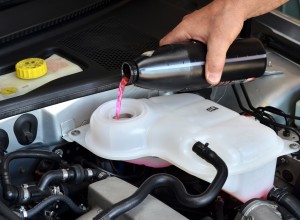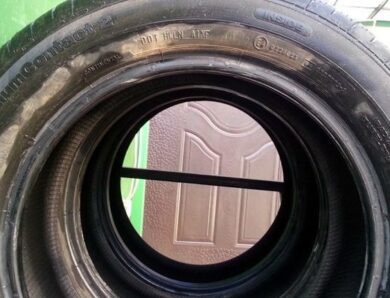Polish for glass: how to choose and how to use?
Restoring and protecting car windows worries everyone, who drives the car. By all means, which serve this purpose, the most popular polish for car glass. It allows you to properly get rid of defects on the windows of the car and protect against new damage.
Drivers are well aware, that the surface of the car windows eventually loses its original appearance. They are cloudy, covered with scratches, chips and microscopic dents. This is due to the fact, that they are influenced by negative external factors:
- ultraviolet radiation - through it the windows turn yellow and cloudy over time, losing its transparency;
- particles of sand and dust - the headwind with their help causes significant damage to the windows of the car, leaving potholes and dents;
- gravel and stones, flying from under the wheels of other cars;
The condition of car windows is affected by temperature changes, precipitation, impurities are contained in water and more
- tree branches, growing near the road;
- ice cubes, rain, etc. .;
- wipers for cleaning car windows - small dust particles get under the erasers, which act as an abrasive, leaving behind characteristic grooves.
It is impossible to avoid the influence of the above factors, otherwise the car must be kept in the garage continuously. Even the most careful operation later leads to defects and damage. Polish for glass allows you to remove them, returning the windows to their original appearance.
Polishing can be done manually or by machine. The second approach is more effective, as it provides:
Properly selected and used in accordance with the instructions polish for car glass will get rid of cracks and scratches, will add shine
- high performance;
- uniformity of processing;
- saving time and effort;
- precision.
You can manually achieve the desired result, however, this will take much longer. in addition, to make hand-processed glass look, as new, good skills in works of this kind are required.
Types of means for polishing the glass surface
Modern industry gives car owners a wide selection of different tools for polishing car windows. On the shelves of car shops you can see a large number of polishes from Japan, Germany, Poland, The Netherlands and from domestic producers.
Polishing agents are divided into three categories:
- Protective. This group is assigned, to protect the surface from all sorts of negative influences. Such substances after application create a protective film, which avoids the appearance of defects.
- Optical. Funds from this group fill all potholes and scratches with their microparticles, resulting in a visual sensation, that the car windows are brand new.
Glass is used to make many items, therefore, there are many polishes for him
- Abrasive. This category is intended, to remove scratches and potholes from the surface, make it smooth and shiny. Abrasive paste for windshield polishing works on the same principle, as a paste for polishing the car body. It uses abrasive particles to smooth out all scratches and micro-irregularities, removing any protrusions in the relief.
The composition of polishes are different - the most common funds based on Teflon and wax.
Teflon is a unique protective material, because after application it prevents the adhesion of any dirt or moisture. in addition, thin Teflon film has high transparency, therefore, it does not affect the light transmission capacity of the windows in any way. Protective coating of Teflon prevents matting due to the abrasive effect of fine grains of sand and road dust.
Wax-based glass polish has more modest protective properties, and lasts less time. However, many drivers use it successfully, because the cost of wax is much lower, than Teflon.
For manual polishing of windows GOI pastes with various degree of granularity are used. The fourth number is the largest grain size, it is recommended to remove scratches and potholes. The trio helps to cope with the effect of matting, which arises from the influence of sand, occurring in the oncoming air flow. Two is a fine finish, that allows to level the general relief and to achieve the maximum uniformity.
Ceramic polish for the carMany substances are used as components for the preparation of the mixture, which affect the treated surface in different ways
Step-by-step process of abrasive polishing of glass by machine method
Abrasive polishing is performed in a well-lit and ventilated room. The presence of dirt or dust is not allowed. That the work was successful, conditions must be "sterile".
As mentioned above, for abrasive processing it is recommended to use the grinder - manual work will give less result at the big expense of forces. Therefore we choose the machine and polishing wheels with various degree of granularity - from big grain to felt and foam rubber., which are used at the finishing stage.
The most popular companies, producing different types of polishes - Sonax, TurtleWax, 3M, DoctorWax
The work process is as follows:
- Wash the windows thoroughly, with whom we intend to work, and wipe them dry.
- We perform degreasing with the help of special tools.
- Inspect the surface in good light and find the largest scratches and chips, marking them with a marker.
- Apply to these areas coarse-grained abrasive paste and begin to grind. At the same time we are watching, so that the surface does not overheat - otherwise it may not withstand high temperatures and burst. The pressure on the tool should be as follows, to maintain a reasonable balance between productivity and caution. With strong pressure we can get a crack, and when weak - the work will move very slowly and to no avail.
- After the areas with the most noticeable defects are treated, change the circle to reduce the grain size and apply the following type of abrasive paste with finer grains. We perform grinding of all surface, leveling the relief and getting rid of opacity. At this stage, you need to eliminate the differences, so that the difference in relief was not more than one particle of abrasive. Watch it, that the circle did not remain for a long time on one site - it creates danger of grinding of holes.
- Once the inequalities are eliminated, start finishing - for this we take a felt circle and a paste for finishing polishing. Apply the paste and typewriter carefully polish it on the surface.
- The final stage of work will be the application of protective equipment, which will protect the surface from the appearance of new defects and preserve the results of your work for a long time.
Blue clay 3M for cleaning a car bodyFor glass with medium damage, when there are scratches, requires abrasive grinding
If severe scratches or chips are found, use optical polish, which will fill the defect with its microparticles and make it invisible.
It is better to choose a grinder for work, which maintains a constant number of revolutions at any effort, which you attach to it. This will ensure uniformity of processing and efficiency. Polishing and grinding are time consuming operations, time consuming. Therefore, the amount of time and effort largely depends on the quality of the tool, spent on work, as well as surface quality.
Manual polishing with GOI paste
Manual polishing is performed using GOI paste. This lesson is time consuming, which takes a lot of time and effort. The process is as follows:
- The windows of the machine must be thoroughly washed and wiped dry.
- We perform degreasing of the surface.
- Carry out a preliminary inspection and mark with a marker the most damaged areas of the surface.
- On a microfiber napkin, apply GOI paste with the largest grain size - four. For efficiency, you can sprinkle a little gasoline on a rag. Next, treat the area with a napkin, which were previously marked with a marker. We continue the operation until then, until we smooth the edges of scratches and potholes.
Polished car windows do not require frequent washing, so, sponges and rags will leave fewer marks in the form of scratches and abrasions
- On another napkin, apply GOI paste with a smaller grain size - three, and polish on the window, eliminating the difference in the height of the terrain. At this stage, we get rid of "abrasive opacity", caused by sand and dust.
- We take a new napkin and put "two" on it, it will provide finishing alignment and will allow to remove microscopic furrows from previous pastes.
- Apply a finishing polish of the protective type and carefully polish it in a circular motion, following uniformity.
Manual work will not give that result, which you can get, using a grinder. So try to buy or borrow a tool, so as not to waste energy and time on unproductive work.
choice of polish
The market is full of different types of automotive glass polishes. Japanese, German, Polish, Russian companies offer a wide selection of car care products for every taste and in different price categories.
To ensure proper care of the car windows, try not to save on polishing products - a lot depends on their quality. Turtle Wax brands are the most popular brands, DoctorWax, Sonax.
If you can't decide, which tool to prefer, consult the sellers in the car shop - they will acquaint you with the features of different brands and give useful advice.
It is important to understand, that the opaque frosted windows of the car, covered with scratches and chips, spoil the appearance and adversely affect the safety of the driver and passengers. Practice shows, that the deterioration of visibility due to poor inspection due to damaged glass causes a large number of accidents. So, taking care of the windows of your car, you take care of your safety and the safety of the car.




